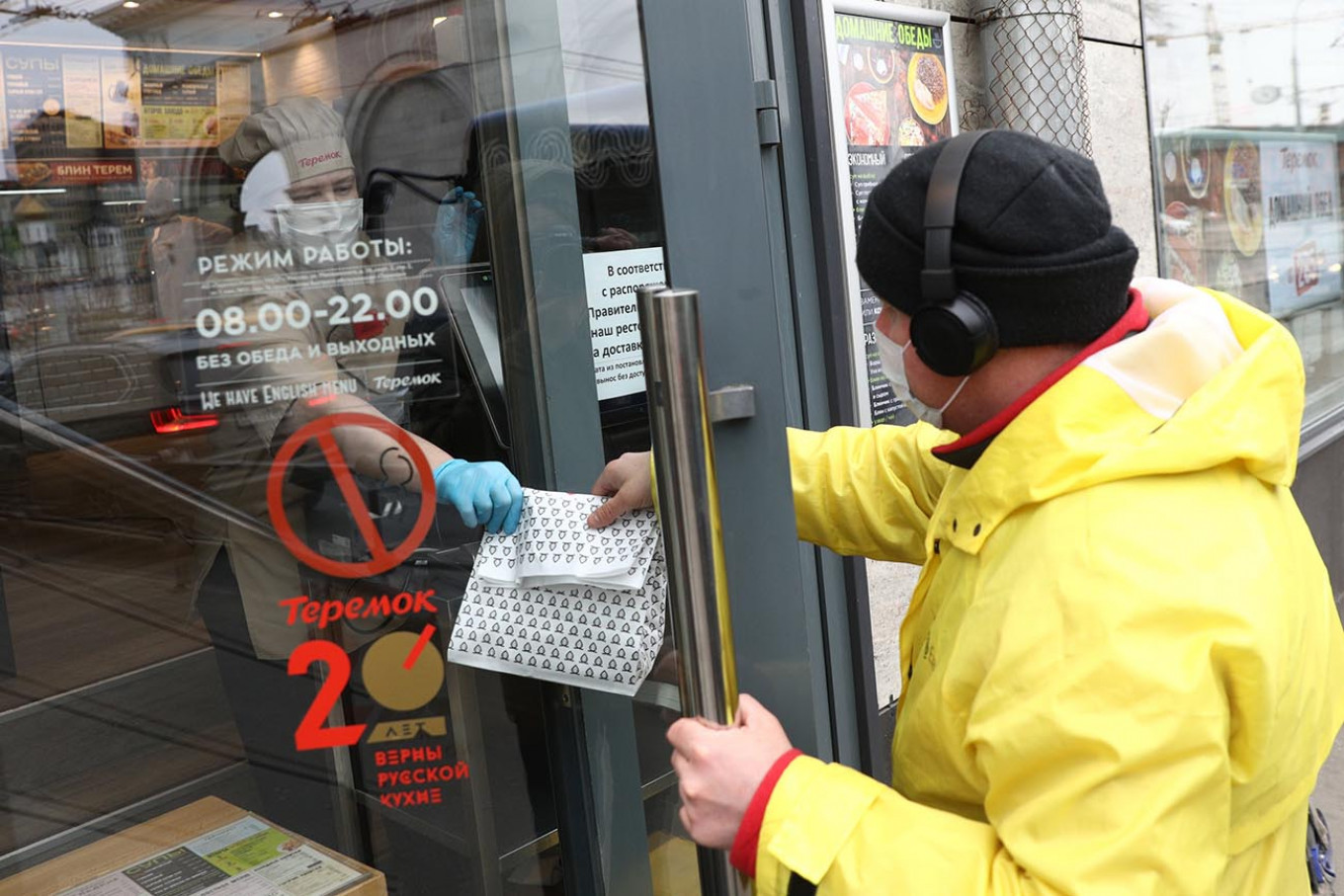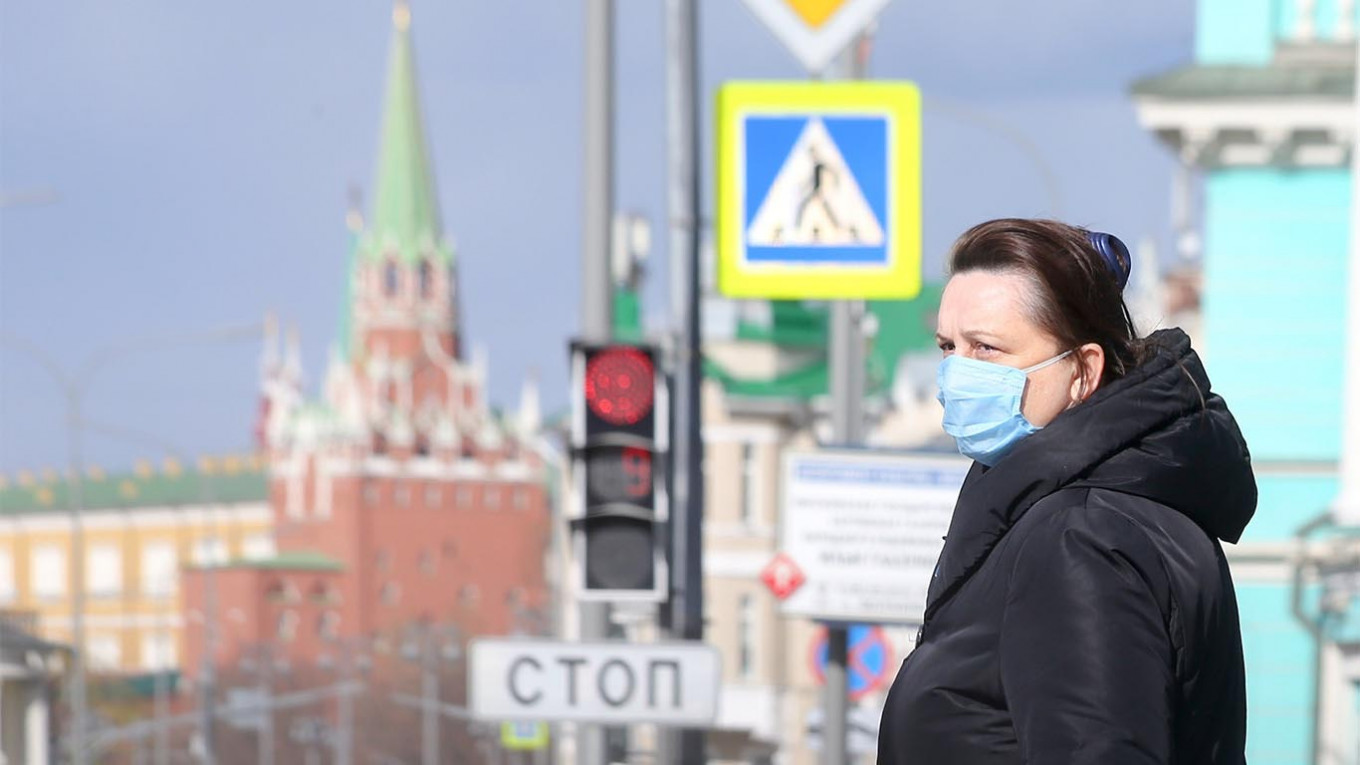At the end of March, the day after Russian President Vladimir Putin had announced a week-long paid holiday to keep Russians at home and slow the spread of the coronavirus, he and a few advisors explained to a handful of business owners how the government was going to help them foot the bill.
The curiously-named “non-working week” would see all non-essential businesses shuttered, Putin had said, while employers would be legally required to carry on paying staff. Chief among the new measures to help them do that would be a salary loans scheme of state-backed interest free credit. Russia’s largest lenders would be launching it within a matter of days, businesses were told.
Three weeks later, after repeated complaints that banks were delaying or rejecting loan requests, Russia’s Economy Minister decided to test the program himself. Pretending to be an entrepreneur in need of support, Maxim Reshetnikov called two of Russia’s largest lenders.
“In one case, the hotline operator said the government had not yet signed the relevant decree, and at the other, they promised to issue a loan, but ... in May,” he posted on Instagram following the experiment. Criticizing the banks for not acting faster, he added: “The stabilization of the economy now largely depends on how decisions made by the Russian government are implemented in the real economy.”
That message was echoed almost word-for-word by Putin himself in another televised meeting Thursday where he told the country’s top banks directly: “It largely depends on you now to ensure that the support measures work effectively and reach everyone who needs them.”
While the Kremlin insists that it has played its part in the economic response, giving banks or governors the tools to help businesses and households, that feeling is not shared on the ground.
Instead, after four “non-working weeks,” confusion surrounds Russia’s economic response to the coronavirus, as hard-pressed households and closed businesses continue to come up against the same problem as Reshetnikov: How can they get hold of the support promised by the president on national television?
Red tape
“The measures are selective and the conditions are not clear to everybody, while not all of them are rolled out in the regions at the same time,” said Platforma sociologist Maria Makusheva. “People started asking for support straight after the president’s address, but the mechanisms were not in place then. So they face rejection, which then creates a sense of injustice and strengthens the perception of problems around red tape.”
A survey conducted by Platforma found that only one in six people who fit into a so-called “preferential category,” such as pensioners, families with young children or the unemployed have received extra support from the government so far. Just 20% of people who are out of work said they were officially registered unemployed, while twice as many had tried but failed to join the system.
A legal helpline set up by Agora — a small group of independent lawyers who usually deal with human rights issues — are still overwhelmed with hundreds of queries from businesses over a string of issues, including who can stay open, who must close, labor rights during the lockdown, rules around salary cuts, redundancies and remote working, lawyer Airat Kamalov told The Moscow Times.

The speed with which new regulations are being introduced also adds to the confusion, with local administrations engaged in a continuous exercise of rolling out new orders, seeing how they work in practice, and then issuing clarifications if they don’t go to plan, lawyers say.
Some businesses which initially closed following Putin’s first address have discovered they can stay open. Sberbank closed some branches and cut hours, but now says it is back operating at 100%.
Construction projects, meanwhile, remain caught in a tussle between national and regional diktats. The Moscow mayor has put all building work on hold until the end of April, yet at a recent meeting with industry bosses, Putin told officials and regional governors it was crucial not to “slow down construction or freeze projects,” and added the sector to the Kremlin’s list of seriously affected industries — inclusion onto which opens up the top tier of government support and cheap loans.
Busy streets
The fundamental confusion over the nature of Russia’s lockdown is most visible on city streets. Despite Moscow having one of the strictest isolation regimes in the world, requiring digital passes and prohibiting outdoor exercise, the Russian capital is far from locked down and still significantly more active than nearly every other major city in Europe and the U.S., a string of mobility indicators shows.
Passenger numbers on Moscow’s metro network are running at 16% of usual levels, but that compares to 7% in New York City and just 5% in London. Meanwhile, journeys in taxis and private cars are still at over 40% of pre-crisis levels.
Outside Moscow, isolation and quarantine measures are even looser, with the Kremlin’s decision to give regions the power to decide on the extent of the lockdown another source of confusion.
“Putin doesn't like to take responsibility for tough decisions, so in his addresses, he basically said ‘let regional governors decide how to implement lockdowns,’” said economist Sergei Guriev, who has been vocal in his criticism of the government’s response to the crisis.
“There are too many governors and mayors who are, on paper, pretending to follow the orders, but de facto are weakening the measures and making concessions in terms of lockdowns,” he added, giving the example of the Mayor of Sayansk, who said his region could not afford the lockdown. He eventually closed restaurants, but kept barber shops open. “He was too public about it, but many smaller places are doing the same.”
Fuad Aleskerov, a professor at Moscow’s Higher School of Economics told a similar story about regional disparity in Russia’s lockdown measures.
“In some places, they do not follow these restrictions very seriously. Around 45 of Russia’s regions have strict restrictions, and the other 40 don’t. And even in Moscow, where there are strict restrictions, not many people are well-disciplined,” he said.
For businesses, this patchwork creates new layers of difficulties at a time of already unprecedented challenges.
“Everything depends on the local administration, and the situation changes every day,” Vadim Ivkin, general director of Vesko Construction told The Moscow Times. He recalled how some administrations temporarily banned heavy goods vehicles entering their regions, meaning he had to break up orders from suppliers into smaller batches to physically move them. “That particular issue is resolved now, but in general, we are waiting for the authorities to set some clearer rules.”
Image problems
Political scientist Tatiana Stanovaya, says the confusion comes from the top.
“The main problem with the coronavirus situation in Russia is the complete failure of information policy … The government continues to make one big mistake: publicly underestimating the critical nature of the situation and staying silent about the most pressing problems,” she told The Moscow Times.
Putin himself has “belittled the scale of the crisis” and struck a tone which is “radically different from the mood of those who have lost their income,” she added, pointing to his recent video address to mark Orthodox Easter.

“The president was sprawled in his chair with an Easter spread fit for 10, strangely grinning and praising himself, saying ‘the situation is under complete control.’ It’s not enough.”
Guriev said that for many parts of Russia a strict quarantine is simply too expensive to follow. Moreover, he expects to see more protests outside Moscow, such as those seen in Vladikavkaz this week, against the lockdown.
“This is an unprecedented fiscal challenge for Putin,” Guriev added. “He’s never seen oil prices at this level. He doesn't know how to run a country with oil prices so low. It’s a challenge for him to pick priorities. Something has to give.”
A Message from The Moscow Times:
Dear readers,
We are facing unprecedented challenges. Russia's Prosecutor General's Office has designated The Moscow Times as an "undesirable" organization, criminalizing our work and putting our staff at risk of prosecution. This follows our earlier unjust labeling as a "foreign agent."
These actions are direct attempts to silence independent journalism in Russia. The authorities claim our work "discredits the decisions of the Russian leadership." We see things differently: we strive to provide accurate, unbiased reporting on Russia.
We, the journalists of The Moscow Times, refuse to be silenced. But to continue our work, we need your help.
Your support, no matter how small, makes a world of difference. If you can, please support us monthly starting from just $2. It's quick to set up, and every contribution makes a significant impact.
By supporting The Moscow Times, you're defending open, independent journalism in the face of repression. Thank you for standing with us.
Remind me later.







